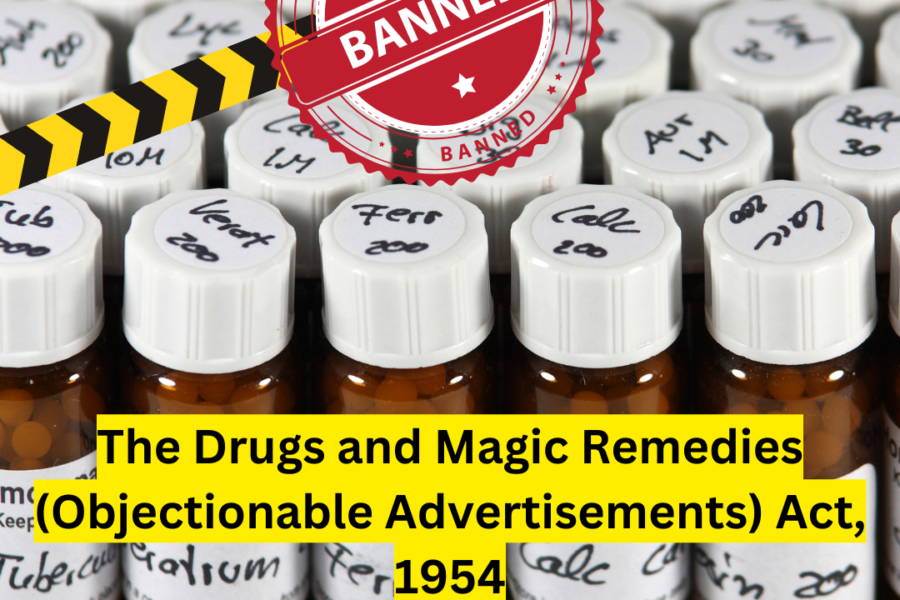The Drugs and Magic Remedies (Objectionable Advertisements) Act, 1954 is a crucial piece of legislation in India aimed at regulating and prohibiting the advertisement of certain drugs and magic remedies that claim to cure or mitigate specific diseases, disorders, or conditions. This act was enacted to safeguard public health and prevent the dissemination of false or misleading advertisements promoting drugs and remedies that lack scientific evidence or medical efficacy. This article aims to provide a comprehensive overview of the Drugs and Magic Remedies (Objectionable Advertisements) Act, 1954, including its key provisions, objectives, and implications.
Objectives of the Act:
The primary objectives of the Drugs and Magic Remedies (Objectionable Advertisements) Act, 1954 are:
- Protection of Public Health:
- The act aims to protect public health by prohibiting the advertisement of drugs and magic remedies that make false or exaggerated claims regarding their efficacy in curing or treating various diseases, disorders, or conditions.
- Regulation of Advertisements:
- It seeks to regulate the advertisement of drugs and magic remedies to ensure that such advertisements are accurate, truthful, and based on scientific evidence.
- Prevention of Misleading Claims:
- The act aims to prevent the dissemination of misleading or deceptive advertisements that may mislead consumers into purchasing ineffective or potentially harmful drugs or remedies.
Key Provisions of the Act:
- Definition of “Drug” and “Magic Remedy” (Section 2):
- Section 2 of the act provides definitions for the terms “drug” and “magic remedy.” A “drug” includes any substance intended for use in the diagnosis, treatment, mitigation, or prevention of disease in humans or animals. A “magic remedy” refers to any talisman, mantra, kavacha, or any other object claimed to possess magical properties for the treatment, cure, or prevention of diseases.
- Prohibition of Certain Advertisements (Section 3):
- Section 3 of the act prohibits the advertisement of drugs and magic remedies that claim to cure or mitigate specific diseases, disorders, or conditions specified in the act. These include diseases such as cancer, tuberculosis, diabetes, leprosy, epilepsy, and venereal diseases, among others.
- Exceptions (Section 4):
- Section 4 provides certain exceptions to the prohibition on advertisements. Advertisements of drugs and magic remedies may be allowed if they are made following the provisions of the Drugs and Cosmetics Act, 1940, or any other law regulating the sale of drugs.
- Penalties (Section 5):
- Section 5 prescribes penalties for contravention of the provisions of the act. Any person who contravenes the provisions of the act by advertising drugs or magic remedies in violation of the law is liable to imprisonment and a fine.
- Offences by Companies (Section 6):
- Section 6 specifies that if the person contravening the provisions of the act is a company, every person who, at the time of the offense, was in charge of, and was responsible to, the company for the conduct of its business shall be deemed to be guilty of the offense.
- Cognizance of Offences (Section 7):
- Section 7 provides for the cognizance of offenses under the act. No court shall take cognizance of any offense under the act except on a complaint made by the Central Government or any person authorized by it.
- Power to Prohibit Advertisements (Section 8):
- Section 8 empowers the Central Government to prohibit the import into, or export from, India of any drug or magic remedy, the advertisement of which is prohibited under the act.
- Protection of Action Taken in Good Faith (Section 9):
- Section 9 protects from legal proceedings to persons acting in good faith under the act.
Implications and Enforcement:
The Drugs and Magic Remedies (Objectionable Advertisements) Act, 1954 has significant implications for advertisers, manufacturers, and distributors of drugs and magic remedies in India. Advertisers must ensure that their advertisements comply with the provisions of the act and refrain from making false or misleading claims regarding the efficacy of their products in curing or treating diseases.
Enforcement of the act is primarily the responsibility of the Central Government, which may take action against violators through regulatory authorities such as the Drugs Controller General of India (DCGI). Violators of the act may face criminal prosecution, including imprisonment and fines, as prescribed under the relevant sections of the act.
Conclusion:
In conclusion, the Drugs and Magic Remedies (Objectionable Advertisements) Act, 1954 plays a vital role in regulating the advertisement of drugs and magic remedies in India. By prohibiting the advertisement of certain drugs and remedies claiming to cure or mitigate specific diseases, the act aims to protect public health and prevent the dissemination of false or misleading information. Advertisers, manufacturers, and distributors must adhere to the provisions of the act to ensure compliance with the law and avoid legal consequences. Effective enforcement of the act is essential to safeguarding public health and promoting ethical advertising practices in the pharmaceutical and healthcare sectors.
Adv. Khanak Sharma

